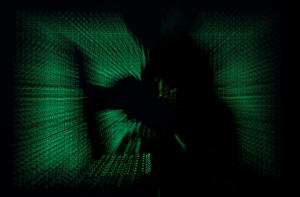Germany and allies accuse Russia of sweeping cyberattacks
 Send a link to a friend
Send a link to a friend
 [May 04, 2024]
By Friederike Heine and Jan Lopatka [May 04, 2024]
By Friederike Heine and Jan Lopatka
BERLIN (Reuters) -Germany accused Russia on Friday of launching
cyberattacks on its defense and aerospace firms and ruling party, as
well as targets in other countries, and warned there would be
unspecified consequences.
Russia's embassy in Berlin dismissed the accusations - that were echoed
by the Czech Republic, the NATO defense alliance and the U.S. State
Department - calling them "another unfriendly step aimed at inciting
anti-Russian sentiments in Germany".
NATO said the campaign had also targeted government bodies, "critical
infrastructure operators" and other entities in Lithuania, Poland,
Slovakia and Sweden.
The accusations come at a time of heightened anxiety in Europe over
suspected Russian hackers and spies since Moscow's invasion of Ukraine
in 2022, and in the run-up to European elections.
Germany's government said it had summoned Russia's envoy to protest over
what it said was a campaign launched two years ago by a group linked to
Moscow's GRU military intelligence agency.
The attacks targeted Germany's governing Social Democrats as well as
companies in the logistics, defense, aerospace and IT sectors, the
interior ministry said in a statement.
Servers of companies in critical sectors had been compromised, a
ministry spokesman added, without naming the companies or going into
further details on the damage.

"These attacks are not just aimed at individual parties or specific
politicians, but at shaking confidence in our democracy," German
Interior Minister Nancy Faeser said.
Germany and its partners would not tolerate the attacks and "will use
the entire spectrum of measures to prevent, deter and respond to
Russia's aggressive behavior in cyberspace," a spokesperson from
Germany's foreign ministry said.
FANCY BEAR AND GOOSE EGG
The Czech Republic said a number of its entities, that it did not name,
had been hit by the Russian campaign since last year.
"In the context of the upcoming European elections, national elections
in a number of European countries and the ongoing Russian aggression
against Ukraine, these acts are particularly serious and reprehensible,"
the Czech foreign ministry said.
[to top of second column]
|

A hooded man holds laptop computer as cyber code is projected on him
in this illustration picture taken on May 13, 2017. REUTERS/Kacper
Pempel/Illustration/File Photo

In a separate statement, Britain accused Russia of undermining
democratic processes, without going into further detail.
Germany's SPD had previously said the email accounts of senior
members had been targeted but that it was not clear whether data had
been stolen.
The interior ministry in Berlin said a group called "Fancy Bear" or
APT28, which reports to the GRU, exploited a then-unknown
vulnerability in Microsoft Outlook over a longer period of time in
order to compromise email accounts.
An international operation led by the FBI in January had prevented
devices compromised in the attacks from being misused for
cyberespionage operations worldwide, Berlin said.
A German spokesperson for Microsoft referred Reuters to a blog post
stating that a Russian-based actor had been using a tool referred to
as GooseEgg since as early as April 2019 to steal credentials.
APT28 has been active worldwide since at least 2004, primarily in
the field of cyberespionage, hacking experts say.
According to Germany's domestic intelligence agency, it is one of
the most active and dangerous cyber actors worldwide.
U.S. intelligence agencies have in the past warned about the potent
cyber capabilities of actors controlled by GRU. They have blamed
Fancy Bear for hacking the email accounts of Hillary Clinton's staff
before the 2016 election.
In 2016, the World Anti-Doping Agency accused Russian hackers of
stealing confidential medical information about U.S. Olympic
athletes and publishing it online. The FBI later seized the domain
of the site - www.fancybear.net - where the information was
released.
(Reporting by Friederike Heine, Alasdair Pal, Andreas Rinke, Jan
Lopatka, Miranda Murray, Rachel More, James Pearson, Andrey Sychev
Writing by Friederike Heine and Matthias Williams Editing by Rachel
More, Frances Kerry and Andrew Heavens)
[© 2024 Thomson Reuters. All rights reserved.]This material
may not be published, broadcast, rewritten or redistributed.
Thompson Reuters is solely responsible for this content. |